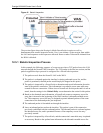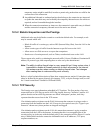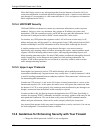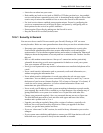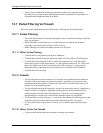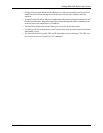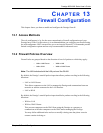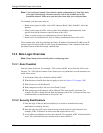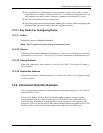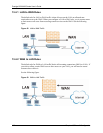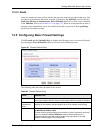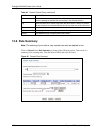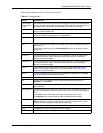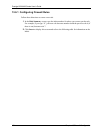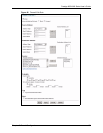
Prestige 660H/HW Series User’s Guide
145 Chapter 13 Firewall Configuration
Note: If you configure firewall rules without a good understanding of how they work,
you might inadvertently introduce security risks to the firewall and to the
protected network. Make sure you test your rules after you configure them.
For example, you may create rules to:
• Block certain types of traffic, such as IRC (Internet Relay Chat), from the LAN to the
Internet.
• Allow certain types of traffic, such as Lotus Notes database synchronization, from
specific hosts on the Internet to specific hosts on the LAN.
• Allow everyone except your competitors to access a Web server.
• Restrict use of certain protocols, such as Telnet, to authorized users on the LAN.
These custom rules work by comparing the Source IP address, Destination IP address and IP
protocol type of network traffic to rules set by the administrator. Your customized rules take
precedence and override the Prestige’s default rules.
13.3 Rule Logic Overview
Note: Study these points carefully before configuring rules.
13.3.1 Rule Checklist
State the intent of the rule. For example, “This restricts all IRC access from the LAN to the
Internet.” Or, “This allows a remote Lotus Notes server to synchronize over the Internet to an
inside Notes server.”
1 Is the intent of the rule to forward or block traffic?
2 What direction of traffic does the rule apply to (refer to Section 13.2 on page 144)?
3 What IP services will be affected?
4 What computers on the LAN are to be affected (if any)?
5 What computers on the Internet will be affected? The more specific, the better. For
example, if traffic is being allowed from the Internet to the LAN, it is better to allow only
certain machines on the Internet to access the LAN.
13.3.2 Security Ramifications
1 Once the logic of the rule has been defined, it is critical to consider the security
ramifications created by the rule:
2 Does this rule stop LAN users from accessing critical resources on the Internet? For
example, if IRC is blocked, are there users that require this service?
3 Is it possible to modify the rule to be more specific? For example, if IRC is blocked for all
users, will a rule that blocks just certain users be more effective?



